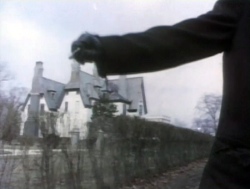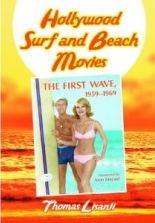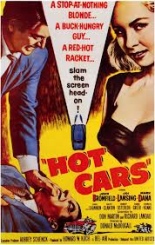
 Nick Dunn (John Bromfield, Revenge of the Creature) is the worst kind of used-car salesman: honest. His sales position at the Big John lot is eradicated after he lets a $700 MG sale collapse because he points out all its safety features, or lack thereof.
Nick Dunn (John Bromfield, Revenge of the Creature) is the worst kind of used-car salesman: honest. His sales position at the Big John lot is eradicated after he lets a $700 MG sale collapse because he points out all its safety features, or lack thereof.
Dangling wads of cash, a flashy man named Markel (Ralph Clanton, 1950’s Cyrano de Bergerac) hires Dunn for one of his lots in a deal that seems to good to be true. That’s because, as Dunn is informed by a nosy detective (Dabbs Greer, Invasion of the Body Snatchers), it’s a “real cozy hot car racket” for stolen vehicles. Being a square-jawed, stand-up guy, Dunn quits … but then asks for the gig back when a hospitalization of his infant son for some vague malady forces him to change his tune.
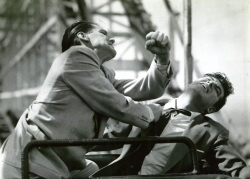 Steered with no-nonsense efficiency by Western TV director Don McDougall, Hot Cars runs exactly one full hour, giving the story no time to idle. It’s a nice, tidy forgotten chunk of noir with a booming Les Baxter score and winning tough-guy dialogue, even for the dames: “I’ve got broad shoulders, Nick. I’ll even let you cry on one of them.”
Steered with no-nonsense efficiency by Western TV director Don McDougall, Hot Cars runs exactly one full hour, giving the story no time to idle. It’s a nice, tidy forgotten chunk of noir with a booming Les Baxter score and winning tough-guy dialogue, even for the dames: “I’ve got broad shoulders, Nick. I’ll even let you cry on one of them.”
That line is spoken by Markel’s mink-wrapped, big-bosomed, kept-blonde hussy (the hubba-hubba Scopitone fantasy girl Joi Lansing) who tests Nick’s loyalty to the wedding ring ’round his finger. And speaking of dangerous curves, the film famously ends with a thrilling fistfight-to-the-death on a moving roller coaster. —Rod Lott

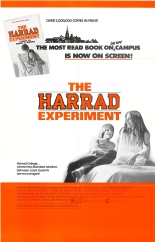
 At Harrad College, they preach and practice free love. Boys and girls are paired up as roommates, encouraged to plug away and attend morning yoga sessions in the nude. This is all fine and dandy if you’re a smooth and suave ladies’ man like Don Johnson, wearing a beret and neckerchief, but a little daunting if you’re, well, Bruno Kirby (
At Harrad College, they preach and practice free love. Boys and girls are paired up as roommates, encouraged to plug away and attend morning yoga sessions in the nude. This is all fine and dandy if you’re a smooth and suave ladies’ man like Don Johnson, wearing a beret and neckerchief, but a little daunting if you’re, well, Bruno Kirby (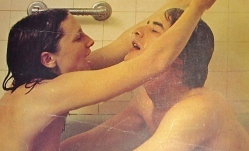 As heads of the school, James Whitmore (
As heads of the school, James Whitmore (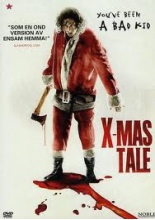
 They even get a crash course in extortion, exploiting her hunger to learn the whereabouts of the millions she stole. An escape, however, is only a matter of time, and Rebeca’s shuffling, ax-dragging body chasing them through an abandoned amusement park reminds the kids of Zombie Invasion, a film-within-the-film (starring
They even get a crash course in extortion, exploiting her hunger to learn the whereabouts of the millions she stole. An escape, however, is only a matter of time, and Rebeca’s shuffling, ax-dragging body chasing them through an abandoned amusement park reminds the kids of Zombie Invasion, a film-within-the-film (starring 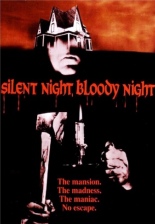
 On Christmas Eve 1950, the only thing roasting at the Wilfred Butler mansion was Wilfred Butler himself! Mysteriously dying by fire, he left his estate to his only surviving family member, grandson Jeffrey (James Patterson,
On Christmas Eve 1950, the only thing roasting at the Wilfred Butler mansion was Wilfred Butler himself! Mysteriously dying by fire, he left his estate to his only surviving family member, grandson Jeffrey (James Patterson, 